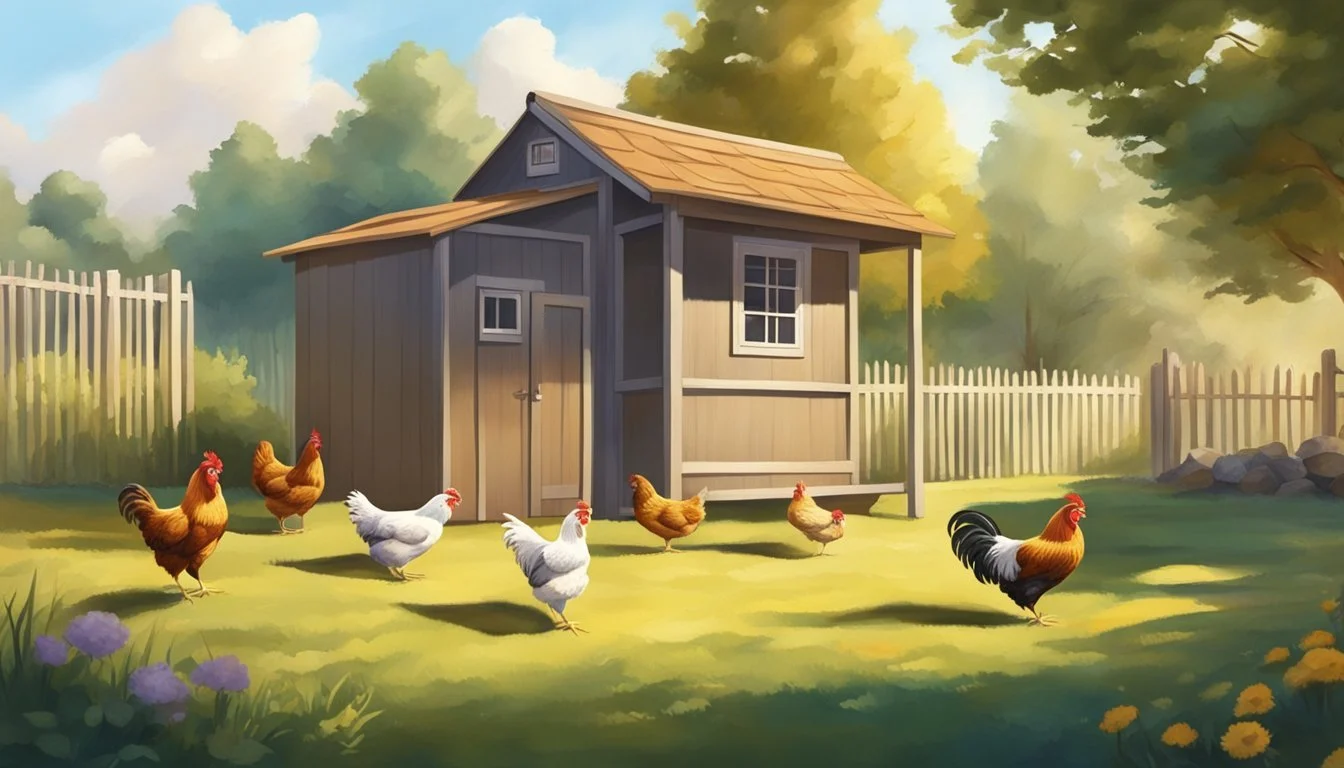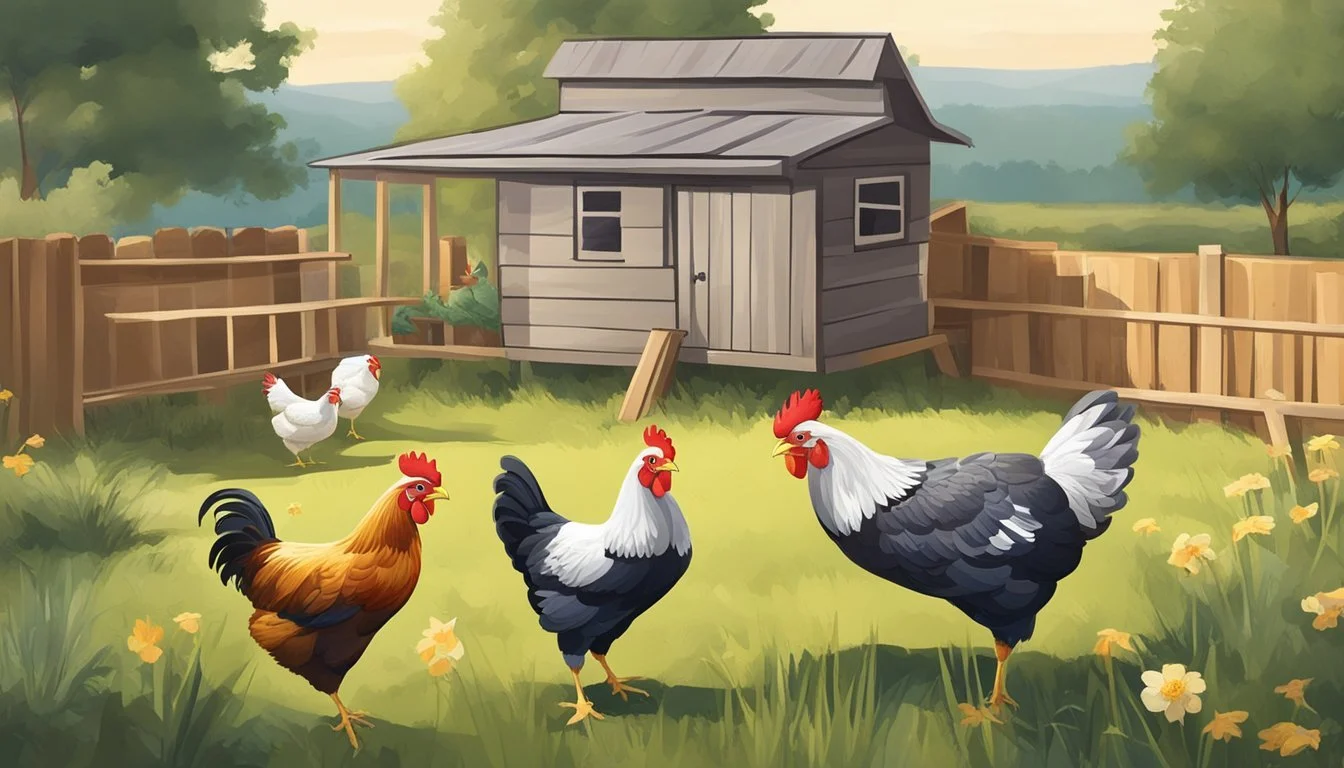Keeping Backyard Chickens in Huntsville, AL
A Practical Guide
Backyard chicken keeping has become increasingly popular across the United States, and Huntsville, Alabama, is no exception. This rise in popularity stems from various motivations, such as the desire for fresh eggs, natural pest control, or simply the joy of raising chickens as pets. In Huntsville, residents enjoy the ability to keep hens in their backyards, contributing to sustainable living practices within the city limits.
The city of Huntsville provides clear guidelines that need to be followed for residents to engage in responsible and compliant chicken keeping. Regulations stipulate that chickens must have adequate space, and nuisance noise, as well as odor and sanitation standards, must be upheld to maintain harmony in residential areas. These rules are designed to balance the benefits of raising chickens with the need to minimize disruptions to neighbors and the surrounding community.
While backyard chicken keeping is permissible in Huntsville, those interested in this pursuit must navigate local ordinances carefully. It is important to note that only hens are allowed; roosters are prohibited due to their potential to cause noise disturbances. Understanding and adhering to local regulations ensures that both the chickens and the community can thrive together.
Legal Aspects of Raising Chickens in Huntsville
In Huntsville, Alabama, residents who wish to keep backyard chickens must navigate a series of ordinances and regulations designed to balance urban agriculture with community standards.
Understanding Huntsville's Chicken Ordinance
The City of Huntsville enforces a chicken ordinance that outlines specific rules for residents interested in raising fowl within city limits. Key provisions include a minimum ground space requirement of 15 square feet per fowl. Additionally, all fowl must be maintained in a manner that avoids creating a nuisance through noise or odor, ensuring the health and comfort of neighbors.
Permit Requirements and Limits on Chickens
While some areas may require permits for backyard chickens, in Huntsville, there are limitations on the number of chickens allowed without a permit. Residential properties of less than half an acre are generally permitted to keep a maximum of six hens. It is important for potential chicken owners to verify whether additional permits or approvals are required for their specific circumstances.
Rooster Regulations and Noise Complaints
Due to potential noise complaints, roosters are prohibited on residential properties in Huntsville. The city's noise ordinances are applicable to all animals, and it's worth noting that failure to comply with these regulations could result in animal control officer interventions.
Coop Restrictions and Property Considerations
Housing for backyard chickens in Huntsville must conform to city specifications for coops and enclosures. Coops should be designed to avoid any sanitation issues and must not infringe upon property lines or create disturbances for neighbors. Property owners need to ensure that their intended chicken enclosures adhere to these stipulations before housing chickens.
Choosing the Right Chickens
When selecting chickens for your Huntsville backyard, consideration must be given to local climate compatibility, intended use—whether for egg-laying, meat production, or both—and the potential for keeping chickens as pets.
Breeds Suitable for Huntsville's Climate
Huntsville, Alabama experiences a range of weather conditions. Therefore, one should select chicken breeds that can withstand this variability. Rhode Island Reds and Plymouth Rocks are known for their cold-hardiness and adapt well to cooler temperatures, making them suitable choices for the region's winters.
Egg Laying vs. Meat Production
For those interested in egg production, breeds like Leghorns, revered for their prolific laying abilities, may be the best choice. These hens can provide a steady supply of eggs. On the other hand, chickens such as Cornish Crosses are favored for meat production due to their rapid growth and substantial protein yield.
Dual-Purpose Breeds and Pet Considerations
Dual-purpose breeds cater to both egg and meat demands and are often more robust. Sussex and Orpingtons are excellent dual-purpose varieties that offer a balance between egg laying and suitable meat quality. Additionally, such breeds can be docile, making them good pets. It is important to note that only hens are recommended in Huntsville to comply with local noise ordinances, as roosters are prohibited.
Setting Up Your Chicken Coop
Before introducing chickens to their new home in Huntsville, AL, one must ensure the chicken coop is well-designed, secure, and easy to maintain for the health and comfort of the birds.
Size and Design for Optimal Comfort
The size and design of a chicken coop are crucial in providing a comfortable living space for poultry. Each chicken requires at least 2-3 square feet of space inside the coop and 8-10 square feet outside to engage in natural behaviors such as roosting and dust bathing. For example, for a flock of six hens, a coop with a minimum of 18-30 square feet is needed, plus an outdoor run of at least 48-60 square feet. The design should include:
Ventilation: Adequate airflow without causing drafts
Insulation: Protection against extreme temperatures
Perches: Space for birds to roost comfortably
Security Against Predators
Ensuring the coop is protected from predators is non-negotiable. The coop must be fortified as follows:
Walls and Roofing: Constructed with sturdy materials such as hardware cloth or solid wood
Flooring: Consider burying hardware cloth underground to prevent predators from digging
Locks: Secure latches are essential—simple twist knobs or ties are not enough against raccoons and other clever animals
Maintenance and Keeping It Clean
A clean coop is vital for preventing disease and keeping chickens healthy. Maintenance includes:
Regular Cleaning: Remove droppings and refresh bedding frequently
Design for Easy Access: Doors and panels should allow for easy access to facilitate cleaning
Waste Management: Establish a system to dispose of or compost waste effectively
Following these guidelines for housing size, predator protection, and maintenance will create a secure and healthy environment for backyard chickens in Huntsville.
Feeding and Health Care
Keeping backyard chickens in Huntsville, AL, necessitates a thorough understanding of their dietary requirements and health care needs. The correct feed and consistent access to water are crucial, together with knowledge of common health issues and the adoption of preventative measures.
Nutritional Needs and Feed Types
Chickens require a balanced diet rich in proteins, carbohydrates, vitamins, and minerals. Starting chicks should be fed a starter feed with approximately 18-20% protein to support their rapid growth. As they mature, they can be transitioned to layer feed, which typically contains around 16% protein and added calcium, essential for egg production. Feed is available in various forms, such as mash, pellets, and crumbles; crumbles are often recommended for ease of consumption and reduced waste.
Starter Feed: 18-20% protein, for chicks.
Layer Feed: 16% protein, with added calcium, for laying hens.
Access to Water and Therapeutic Care
Chickens must always have access to clean, fresh water. In times of illness or stress, electrolytes and vitamins might be added to their water to enhance recovery and maintain hydration. Therapeutic care should follow the guidance of a veterinarian, and any treatments for common ailments should ideally be prophylactic and within the legal bounds of backyard poultry care.
Always available: Clean, fresh water.
For recovery/support: Add electrolytes and vitamins to water under stress or illness.
Common Health Issues and Preventative Measures
Backyard chickens in Huntsville can face several health issues such as respiratory infections, parasites, and avian influenza. Preventative measures include maintaining clean housing, regular veterinary checkups, and vaccinations where recommended. It's advisable to purchase feed from reputable feed stores to ensure quality and prevent foodborne illnesses. Monitoring the flock for any signs of distress or disease ensures timely intervention and reduces the spread of illness.
Respiratory infections, parasites, avian influenza: Common health issues.
Clean housing, regular vet checkups, quality feed: Preventative measures.
The Lifecycle of Backyard Chickens
In Huntsville, Alabama, keeping backyard chickens involves understanding their lifecycle from chicks to mature hens. Each stage brings with it different care requirements and milestones that affect the health and productivity of the flock.
From Chicks to Pullets: Early Stages
Chicks require a warm and secure environment for the first weeks of life. It is essential to maintain a brooder with a temperature of 95 degrees Fahrenheit for the initial week, lowering the temperature by 5 degrees each week until they are ready to move to the coop. The early stages are critical for the development of the chicks into pullets, typically around 4-6 months old. During this period, they should be fed a starter-grower feed that contains at least 18 percent protein to aid in robust growth.
The Laying Phase: Understanding Egg Production
Once pullets reach the laying age, which can occur as early as 18 weeks, their nutritional needs shift. A higher calcium diet is required for egg production, and this is when hens typically begin their egg-laying phase. For Huntsville residents, hens will produce eggs regularly, depending on their breed and individual health. Environmental factors such as light exposure directly impact egg production, with hens needing about 14 hours of daylight to maintain a consistent laying cycle.
Aging and End-of-Life Care
As hens age, egg production naturally decreases, and eventually, they will stop laying altogether. The lifespan of a backyard chicken can range from 5 to 10 years. During their golden years, hens will require less protein but should still be provided with a balanced diet and proper care. End-of-life care for chickens involves maintaining their comfort and monitoring for any signs of illness or distress, ensuring they live out their remaining years peacefully and in good health.
Practical Tips and Best Practices
Maintaining a backyard chicken flock in Huntsville, Alabama, requires adhering to local regulations while focusing on the overall well-being of the chickens. Key practices involve proper space allocation, keeping the flock clean and healthy, understanding chicken behaviors, and implementing effective waste management.
Managing Your Backyard Flock
Keeping chickens in your backyard starts with understanding and following local ordinances. In Huntsville, each chicken must have a minimum of 15 square feet of ground space to thrive. For lots with less than a half-acre, up to six hens are allowed; roosters are generally prohibited due to noise concerns.
Daily Water Supply:
1 quart per 4 chickens
Ensure it's always clean and unfrozen
Shelter:
Predator-proof and weather-resistant
Ventilation without drafts
Interaction and Understanding Chicken Personalities
Chickens are known to display a range of personalities, from the docile and friendly to the assertive and even territorial. Observing their interactions can aid in managing their environment more effectively.
Social Dynamics: Identify the pecking order to prevent bullying.
Handling: Regular, gentle handling increases their comfort with human interaction.
Cleaning and Waste Management
Sanitation is critical in a backyard flock to prevent disease and maintain a pleasant environment.
Cleaning Routine:
Daily: Remove and replace any wet or soiled bedding.
Weekly: Clean feeders and waterers.
Monthly: A thorough coop cleaning including nest boxes and perches.
Waste Management:
Composting: Chicken manure can be an excellent compost addition.
Sanitation: Proper disposal methods must be followed to prevent odors and pests.
Community and Resources
Keeping backyard chickens in Huntsville, Alabama is supported by a connected community and valuable resources, including local enthusiasts, online engagement, and universities. These resources provide essential advice, supplies, and research-based information for poultry enthusiasts in the region.
Connecting with Local Poultry Enthusiasts
Local poultry enthusiasts can be an invaluable source of knowledge and support. New and seasoned chicken keepers alike have the opportunity to connect through local farmers' markets, where they can share tips, exchange stories, and sometimes find equipment for sale. The Huntsville Friends of Chickens group meets regularly to discuss urban chicken farming, coop construction, and care practices.
Online Forums and Social Media Groups
Interest in backyard poultry has sparked the creation of online forums and social media groups where keepers can seek advice and support. Platforms like Facebook and BackYard Chickens offer dedicated Huntsville-focused groups that provide a space to ask questions, showcase coops, and discuss chicken breeds that thrive in the local climate. These platforms facilitate an exchange of information and experiences, often leading to offline meetups.
Local Hatcheries and Auburn University's Role
Local hatcheries around Huntsville offer a variety of chicken breeds suitable for backyard coops, providing starters for those new to chicken keeping. Auburn University, recognized for its significant role in agricultural research, imparts crucial knowledge on avian health and husbandry. The university's cooperative extension shares research findings and extends support to the citizens of Huntsville, assisting in the development of a thriving backyard chicken community.








